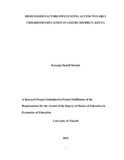| dc.contributor.author | Karanja, Daniel M. | |
| dc.date.accessioned | 2014-09-11T07:02:38Z | |
| dc.date.available | 2014-09-11T07:02:38Z | |
| dc.date.issued | 2014 | |
| dc.identifier.citation | Master Of Education In Economics Of Education University Of Nairobi, 2014 | en_US |
| dc.identifier.uri | http://hdl.handle.net/11295/74298 | |
| dc.description | A Research Project Submitted in Partial Fulfillment of the Requirements for the Award of the Degree of Master of Education in Economics of Education | en_US |
| dc.description.abstract | This research study was aimed at investigating the influencing of home based factors on
access to Early Childhood Education in Limuru District in Kenya. The study examined
the influence of user-fees paid by parents on access, the effect of distance from home to
school on access, the parental level of education and family size on how they affect
access of children in ECE centres. The study could be of major help to the government to
provide Free and compulsory Early childhood Education to enhance equal access to
quality ECE and increase efficiency and equity in education. The findings of the study
would also help parents who may not have known the importance of ECE and make them
enroll their children in school. The study reviewed related literature on access to ECE and
was based on Human Capital Theory. The study adopted a descriptive design targeting 13
head teachers, 33 class teachers and 12 parents in Limuru District. Stratified random
sampling was used for head teachers and class teachers while purposive sampling was
done for parents who children had dropped out of ECE Centres. The study administered a
set if questionnaires to head teachers and class teachers and used an interview guide for
the parents. Validity of the instruments was enhanced through piloting and by experts.
Reliability of the instruments was ensured by rise of Test-Retest method where a
reliability of 0.84 for head teachers and 0.80 for class teachers were achieved. Collected
data was coded and classified into major themes from which a report was made.
Quantitative dada was analyzed using descriptive statistics and presented in form of
tables, graphs and percentages. Data analyzed formed the bases of research findings,
Conclusions and Recommendations of the study. The study established that many
children are not able to access ECE making the Net Enrolment Rate (NER) far
below100% payment of user-fees by parents has been found to be the major obstacle in
accessing ECE as many parents are not able to pay for their children’s education, lack of
awareness by the parents has also been established to be a hindrance to access with some
parents asking why they should pay for ECE yet Primary Education is Free Distance to
school and large family size could also have contributed to reduced access though by a
small margin according to this study. In view of these findings, the study recommended
that ECE should be Free of all direct costs and compulsory while parents should be
sensitized on the importance of ECE. The central Government should also enforce the
children’s act and the Basic education act and prosecute those who fail to enroll their
children at ECE Centres. Taking on Limitation and delimitation of the study, the study
suggested that others be done on school-based factors affecting access to ECE in the
same region as this one dwelt on home-based factors. It was further suggested that a
similar study be carried out in other districts and Counties in order to complement this
study. | en_US |
| dc.language.iso | en | en_US |
| dc.publisher | University of Nairobi, | en_US |
| dc.title | Home based factors influencing access to early childhood education in Limuru district, Kenya | en_US |
| dc.type | Thesis | en_US |
| dc.type.material | en_US | en_US |

